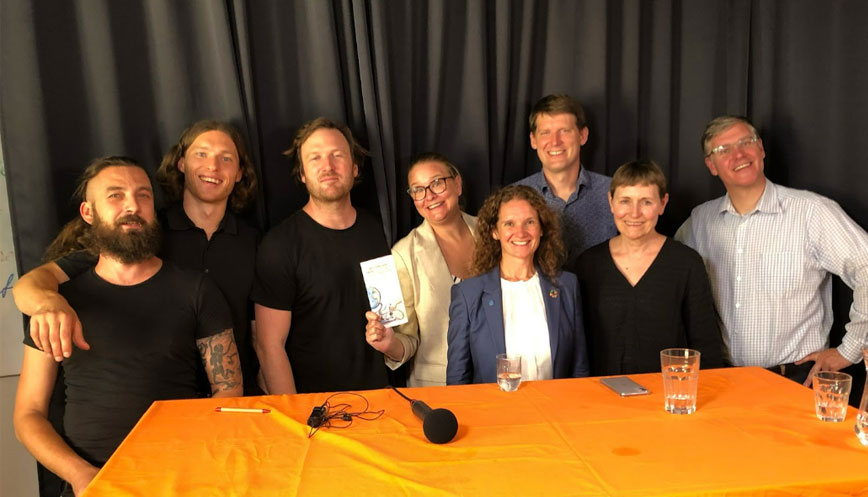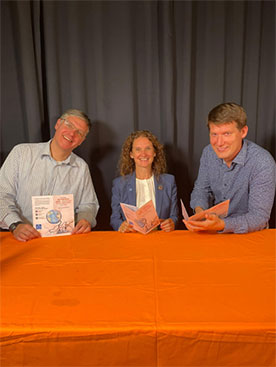Popular new science anthology on energy set to become knowledge platform

When researchers from KTH got together with independent Swedish non-profit membership organisation VA (Public & Science), the result was a popular science book about energy that has received a lot of attention. A webinar was recently held to provide more details about the book and give anyone interested in the project the chance to ask questions.
Research anthology Towards the energy of the future – the invisible revolution behind the electrical socket has been downloaded thousands of times. The anthology is just one example of the aims of the KTH Energy Platform: to create a welcoming meeting space for collaboration and dissemination of knowledge-based research .
“We hope that this book will make available knowledge to politicians and the public in what has become a highly polarised debate over energy,” says Christophe Duwig, editor of the book, professor and KTH Energy Platform Deputy Director.
The collaboration with VA has been key to establishing an accessible scientific language and narrative, Duwig believes.
“We’re so used to writing texts for our colleagues but not as used to writing for the public. It’s been a difficult but enjoyable challenge in which we really benefited from working with VA,” Duwig says.
KTH Energy Platform is now planning to produce additional chapters for the book that will supplement the topics in the current edition and encourage more researchers to provide their knowledge.
“The book has become an additional way for us in the Energy Platform to find more ways to establish new collaborations between more researchers. It’s been a fantastic journey where all the authors have very generously shared their time and knowledge,” says Lina Bertling Tjernberg, professor of electrical power networks and KTH Energy Platform Director.
Calls for a more long-term energy policy

During the webinar about the book, hundreds of participants asked their energy-related questions to the panel. Such as what politicians and citizens need to do to most effectively reduce electricity consumption.
On this point, the panel believed that energy policy must be more long-term and bridge the boundaries that currently exist between political parties.
“We have to work long-term and in Sweden’s best interests, and realise that we are a part of Europe and the world. Decisions must be based on facts and impact analyses, and in this sense collaboration with researchers is especially important. As individuals it is important to avoid using electricity for heating and instead install heat pumps, insulate our homes better, and reduce temperatures in holiday homes. To incentivise this, everyone should change how they pay for their electricity to hourly rates and install the technology that is available,” said Bertling Tjernberg, who pointed out that studies show it is possible to reduce electricity consumption by around 10 per cent with the right choice of technology and practical measures.
Duwig also mentioned the Swedish Energy Agency’s website that provides a large number of tips and advice on how to reduce electricity use.
What do you think about developments in solar and wind power?
“We see considerable potential in offshore wind power in particular, especially when it’s combined with other types of energy and energy storage. And in terms of solar cells, there’s a lot of exciting research being done, for example into new materials for more efficient solar cells,” Bertling Tjernberg said.
Do we need nuclear power to meet energy demand?
“In general, it’s difficult to see how we’ll be able to phase out fossil fuels without nuclear energy. So internationally, demand will be considerable at the same time as there are countries that will manage perfectly well without nuclear power, such as Norway with its access to hydropower,” said Pär Olsson, physics professor at KTH.
Bertling Tjernberg emphasised that Sweden is one of the countries that could manage without nuclear power, but she stressed that this does not mean that this would be a wise choice.
“We need to conduct independent studies on different scenarios which include all types of power, new, flexible solutions, as well as achieving climate goals. In this sense, it’s a great strength that as researchers, we’re independent and can contribute our knowledge to support decision making,” she said.
What is the fastest way to meet today’s increasing electricity demand in Sweden?
“Wind power. We have the technology and experience, and an industry that is ready, so with more permits, we could quickly access more electricity through more wind power,” Bertling Tjernberg said.
Duwig stressed that while future technology offered many promising solutions, we must act now to address climate change.
“We must be pragmatic and focus on phasing out fossil fuels. It’s hard to predict the technologies of the future, so let’s move incrementally forward with the technologies we have today,” Duwig said.
A view that Olsson backed up.
“We need to stop pitting different types of energy against each other and instead see how we can combine them for the best results. We need to focus on all the approaches that are positive for the world’s development and phase out those that are destructive to sustainable development,” Olsson said.
The panel also answered questions on whether hydrogen cars will become an alternative to electric cars, the vulnerability of offshore wind and nuclear power plants to military attack, and when fusion technology might become a reality.
Text: Magnus Trogen Pahlén

